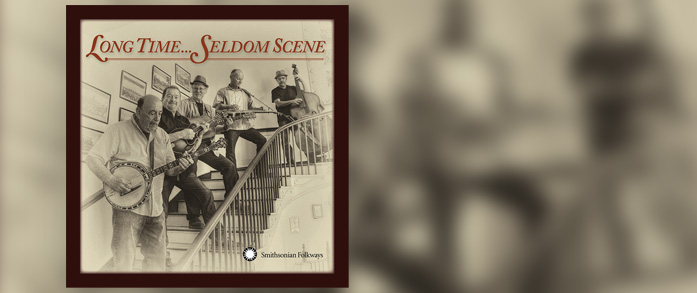
Until the rich history of the Seldom Scene is laid down in book form, the band’s newest CD, Long Time…Seldom Scene, will serve as a terrific Cliff’s Notes version of the story and music.
Long Time, released today by Smithsonian Folkways, is the band’s first project since 2007’s Scenechronized, which was nominated for a Grammy as best bluegrass recording. This one is even better. Indeed, it’s one of the best records the band has created during its 43-year history.
Everything about this CD is a winner, including the detail-rich liner notes, spectacular photography by Michael Oberman, the production and, of course, the music. Intentional or not, the 16 songs presented here trace the arc of the band, from its informal start in a Bethesda, MD, basement to the current lineup, which has itself been together for 18 years.
It’s not just the songs themselves that are special, but how they’re arranged and performed. Two of the three surviving founding members, John Starling and Tom Gray, make guest appearances. The third, Ben Eldridge, still plays banjo in the band.
Other guests include Emmylou Harris, Ben’s son, Chris Eldridge of Punch Brothers fame, and Rickie Simpkins, who has fiddled for Harris and is the brother of Scene bassist Ronnie Simpkins.
On stage, the Scene’s tight harmonies feature Dudley Connell, Fred Travers and Lou Reid, each taking turns singing lead. They do the same on the record, with Starling, the younger Eldridge, and Harris taking lead duties, too, on occasion. The only thing that could make Long Time even better vocally was if we could somehow hear the soaring tenor of the late John Duffey and the smooth baritone of the late Mike Auldridge.
Most of the songs have been recorded by the Scene before, some of them several times. But one song making its debut on a Seldom Scene record is My Better Years. The song was written by the incomparable Hazel Dickens and is sung with aplomb by Connell, who played and sang with Dickens many times over the years. It’s a true story of love and loss about her ex-husband, who tried to come back into her life. Hazel closed her heart, then she opened her notebook: “If you should need a friend, I’ll be there ’til the end. Just don’t ask me to love you again.”
Some of the best moments in the 54 minutes of music recorded here are dark and bluesy songs about regret and hard times, with the instruments and voices underscoring the emotion. The mood is set with the opener, California Cottonfields, which always brings to my mind John Steinbeck’s tales of the Dust Bowl and struggling sharecroppers, then continues with Wait a Minute, the band’s seminal song.
The band’s first recording of Wait a Minute featured Starling and Duffey on vocals. In the current lineup, Reid and Connell trade verses. This version bridges the gap, with Starling singing the kickoff chorus. He must have learned something at his day job as an ear, nose, and throat specialist because his voice still rings years after he stopped singing professionally. Countless songs have been written about the loneliness of life on the road – for both the traveling musicians and those who get left at home – but I’ve heard none better than this Herb Pedersen classic. Here, it’s lifted to an even higher plain by Rickie Simpkins expressive, mournful fiddling.
Another gem of a downcast song is John Prine’s Paradise, punched up to a blistering pace in six-eight time that barely leaves time for Connell to squeeze in all the words. The cautionary tale of big corporations against the little guys includes the memorable chorus, “Oh, daddy, won’t you take me back to Muhlenberg County, down by the Green River where Paradise lay. Well, I’m sorry my son but you’re too late in asking, Mr. Peabody’s coal train has hauled it away.”
The previously mentioned My Better Years fits into this dark category as well. This is just one of many powerful songs that Dickens wrote and recorded at a time when women in bluegrass were practically non-existent, and women in general were told their place. I can’t hear this song without wondering when the powers that be in bluegrass will put Dickens in the place she belongs – in the hall of fame. Of course, the same could be said about the Seldom Scene. This record, frankly, is strong enough to add some fuel to that debate.
The Scene, like the Country Gentlemen, always stretched the boundaries of bluegrass, and this album is no exception. There’s a Bob Dylan tune, It’s All Over Now Baby Blue, which Duffey performed with the Gents and brought with him to the Scene, John Fogerty’s Big Train (From Memphis), and a George Jones’ standard, Walk Through This World with Me (the lead by Fred Travers may be the best vocal performance on a project filled with good ones). There’s even a song previously recorded by The Monkees, What Am I Doing Hanging Around, written by Michael Martin Murphey and Owen Castleman. Also in this group, Hickory Wind. Co-writer Gram Parsons recorded it with Harris before he died in the early 1970s; Harris reprised it on a solo album and now she shares lead vocals with Reid.
There’s just one instrumental, Lorena, which closes the CD. It was a popular tune for both sides in the Civil War and Mike Auldridge made it his signature tune. Travers nails the dobro here, no surprise, given that he used to play along with Scene records when he was learning the instrument, and his wife’s wedding gift to him was a lesson with Mike.
Travers isn’t the only current member who started out as a fan. In 1995, Auldridge, Moondi Klein, and T. Michael Coleman decided to leave the Scene to devote their energies to their other band, Chesapeake, and Bluegrass Unlimited reported the Scene’s apparent demise. Connell called Duffey to ask what had happened. Always a joker, Duffey replied, “We’re not really dissolving the band. We’re just looking for a guitar player, lead singer, baritone singer, dobro player, bass player, bass singer, bus driver.”
Connell worked up the courage to suggest that he and Duffey sing together sometime.
That led to Connell, Travers, and Ronnie Simpkins coming aboard. A year later, Duffey suffered a fatal heart attack and was replaced by Reid, back for his second stint with the band.
Like time itself, the Seldom Scene keeps rolling along. Fortunately for music lovers, the band members slowed down long enough to make this gem of a CD.







